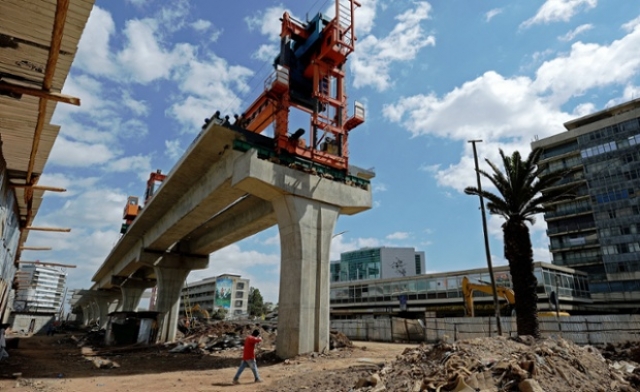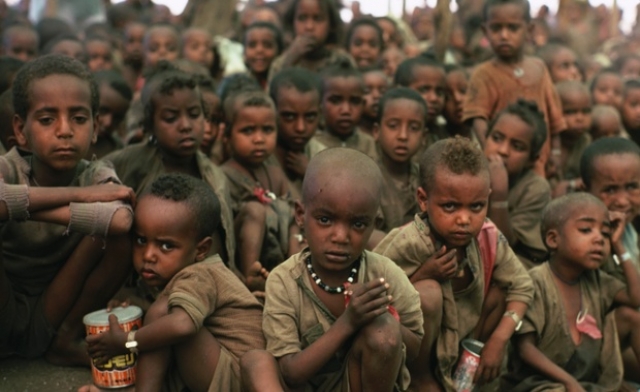 A man walks past a portion of the Addis Ababa light railway under construction in Addis Ababa. (Photograph: Carl de Souza/AFP/Getty Images)
A man walks past a portion of the Addis Ababa light railway under construction in Addis Ababa. (Photograph: Carl de Souza/AFP/Getty Images)
By David Smith
Wednesday 22 October 2014
Addis Ababa – With an Einsteinian shock of hair and a wise man’s beard, Mulugeta Tesfakiros, just off a flight from Washington, settled into an office of glass walls and vibrant artworks in Addis Ababa. The millionaire magnate, who has gone into the local wine business with Bob Geldof, mused on the new Ethiopia: “Most of the people need first security, second food … and democracy after that.”
An hour’s drive away stand the corrugated iron watchtowers of a prison. The inmates include nine bloggers and journalists charged with terrorism. Standing in a bleak courtyard on a family visit day, they talked about how they had been tortured.
“I feel like I don’t know Ethiopia,” one said. “It’s a totally different country for me.”
This is the Janus-faced society that is the second most populous country in Africa. A generation after the famine that pierced the conscience of the world, Ethiopia is both a darling of the international development community and a scourge of the human rights lobby. Even as investment conferences praise it as a trailblazer the entire continent should emulate, organisations such as Human Rights Watch (HRW) describe it as “one of the most repressive media environments in the world”.

Three decades after images that shocked the world, country has become darling of the global development community – and the scourge of the human rights lobby. (Photograph: William Campbell/Sygma/Corbis)
To be in Ethiopia is to witness an economic miracle. The country has enjoyed close to double-digit growth for a decade. One study found it was creating millionaires faster than anywhere else on the continent. The streets of Addis Ababa reverberate with hammering from construction workers as the concrete skeletons of new towers and a monorail project rise into the crane-dotted sky. Ethiopia’s government says it is on course to meet most of the millennium development goals and, by 2025, to be a middle-income country.
Yet the frenetic urban expansion has uprooted thousands of farmers while, critics say, those who speak out against it are rounded up and jailed. Of 547 MPs, only one belongs to an opposition party. Activists and journalists describe an Orwellian surveillance state, breathtaking in scale and scope, in which phone conversations are recorded and emails monitored by thousands of bureaucrats reminiscent of the Stasi in East Berlin. The few who dare to take to the streets in protest are crushed with deadly force. Amnesty International has called it an “onslaught on dissent” in the runup to elections next year.
Read more at The Guardian »
—
Related:
Ethiopian famine: how landmark BBC report influenced modern coverage (The Guardian)
Ethiopia: The famine report that shocked the world (BBC)
Join the conversation on Twitter and Facebook.

























